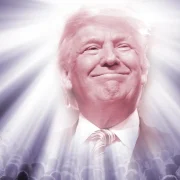Yesterday we heard Vladimir Putin address the Russian parliament, and once again he justified the war in the Ukraine as an attempt “to protect the people in our historical lands.” This has been a familiar theme in the revisionist historiography that enabled Putin to legitimize the bloody conflict that now threatens to engulf the entire world. The idea is a a simple one: Ukraine is a modern artificial construct for which we can blame Stalin and western globalism, though historically, culturally, and spiritually, this region has always been part of Russia.
Those who saw my post last year after outbreak of hostilities will know that I find these historical narratives hopelessly simplistic. As I pointed out before, the inhabitants of the Ukraine have a long history of fighting for independence against foreign empires, including the Mongol empire, the Polish–Lithuanian Commonwealth, the Austria-Hungarian empire, the Ottoman Empire, the Tsardom of Russia, and the USSR. Of these foreign threats, the one that is most relevant to current crisis is the penultimate one I mentioned, namely Russia.
As I pointed out in last year’s article, Russia’s sense of entitlement over Ukraine goes back to 1654 when the Ukrainian Cossacks sought protection from the Russian tsar following threats from Poland. But as is often the case with large empires and small nations on their borders, this led to Russian demands for hegemony. Thus there began a series of military incursions into Ukraine which, in the 18th century, included land confiscations and population displacements. The last remnants of Ukrainian autonomy were erased in 1764 under the expansionist policies of Catherine the Great (1729–96). But Russia was not content with mere political domination and began to demand cultural assimilation. For example, during the reign of Tsar Alexander II (1818–81), the tsarist government banned the publication of books and newspapers in the Ukrainian language while also forbidding the Ukrainian language to be used in schools. This long agenda of trying to force the Ukrainians to forget their own history (an agenda which Putin has now taken up with his revisionist history) was part of the impetus behind the 1862 poem that now forms the nation’s national anthem, “‘Ukraine has not yet perished.”
Even though Putin’s claims over Ukraine are in direct conflict with the historical record, his assertions are now widely repeated by his American sympathizers who have ideological reasons to support his attempts at territorial expansion. They will typically make much of the fact that the Kievan Rus originated in the area we now call Ukraine, as if this somehow vindicates Russian claims over the territory. Yet the Kievan Rus were originally distinct from the Muscovites who became the nucleus of the Russian state and sought to position themselves in the legacy of the Rus by calling themselves Russians. But historically the Rus cannot be collapsed into what we now call “Russians” as the two groups were distinct. The Kievan Rus emerged in the 9th century in the area we now call Ukraine, Belarus, and western Russia, and gave rise to the Grand Princes of Kiev (one such Prince, Vladimir the Great, is responsible for bringing Orthodoxy to the region in the 10th century). By contrast, the Muscovites, only emerged as a dominant political and cultural force in the late medieval period and are associated with the Tsardom of Russia. Originally, the Tsardom of Russia was a weak and relatively minor principality compared to the Rus, though in time this was reversed, and by the 13th century the Rus had been destroyed through the invasion of the Mongols, internal conflicts, and threats from the Grand Duchy of Lithuania and the Kingdom of Poland. But the memory of the Rus remained a matter of nostalgia, which is why the Muscovites began calling themselves Rus during the reign of Ivan the Great (1440-1505) as he was seeking to position his kingdom as the successor to the ancient state in Kiev. Even then, the idea of “Russianness” would not emerge until the reign of Ivan the Terrible (1530-1584), who used the concept to solidify power and expand the territory under his control.
Despite what I have shared, it would also be simplistic to claim that the history of Ukraine is one of a single nation united in their continual fight for independence. The modern area we call Ukraine has involved not only the Kievan Rus, but also the Galicia-Volhynia Kingdom, the Cossack Hetmanate, and other states and people groups. These states were often in conflict with one other, in addition to enjoying periods of cooperation and alliances.
Suffice to say, history is complicated, while the past is way more messy and intricate than tyrants like Putin can countenance.
P.S. For those who think this post signals support of the Zelenskyy regime or United States’ Ukraine policy…well, all I can say is go away the study logic.


